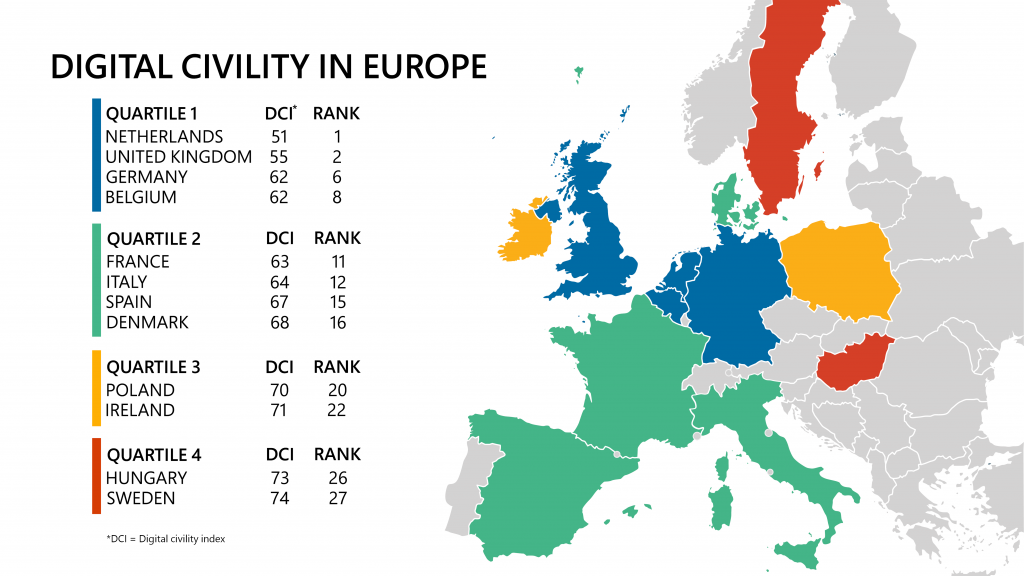The theme of this year’s Safer Internet Day – ‘Together for a Better Internet’ – rightly reflects the role of technology in enabling us to connect and interact, even as the COVID-19 pandemic forces us to remain physically apart. But for everyone to benefit from this, we must continue to foster safe, inclusive and civil online environments.
Today also marks the release of Microsoft’s fifth Digital Civility Index (DCI), outlining people’s opinions on online behavior in 32 countries worldwide. Global results of the Civility, Safety and Interactions Online – 2020 report showed that, on the whole, online civility increased in 2020, with the overall DCI score at 67, improving three percentage points from the previous year – the lowest it has ever been. This is a positive trend, since a lower DCI score indicates fewer negative online experiences and more civil online behavior.
In the Index’s assessment of 21 different online risks across four categories (behavioral, intrusive, sexual and reputational), the findings also highlight another positive trend; people are behaving more conscientiously while spending more time online than before due to the impact of the COVID-19 pandemic. This is particularly true for younger generations – nearly 80% of the upward trend was driven by teenage respondents aged 13 to 17.
Here in Europe, four countries appeared in the best-performing 25 percent of all respondent countries, with the Netherlands topping the global charts, followed by the UK, Germany, and Belgium. This meant that, for the second year in a row, European countries occupied the top two spots.
Improvements in online civility rates were also noted by respondents in Three new European countries – Spain, Denmark, and Sweden – appeared in the Index rankings for the first time this year, with Spain and Denmark ranking in the top half of all countries surveyed.
In addition, a number of European countries reported improved online behavior during the COVID-19 pandemic. In Italy, three in ten people felt this to be the case, as did one in four Spanish respondents and one in five from Sweden. Factors behind this perceived shift include people helping each other out, more people connecting with friends and family, a greater sense of community, and the feeling that “we’re all in this together.”
Sadly, it’s not all good news. In other European countries for which 2019 data was available, online civility was perceived to have worsened, with France and Ireland all reporting a one percent increase in the likelihood of encountering negative online behavior.
And even in the best-performing European countries, over half of respondents reported that they, or a family member, had been exposed to online risks in their lifetime. Overall, in 10 of the 12 European countries surveyed, opinion was divided on whether digital civility had improved or worsened in 2020.
Risks related to the online spread of hate speech or disinformation were reported as more prevalent than ever, while results also point to an increase in the proliferation of false and misleading information, an all-too-familiar concern over the last 12 months, such as hoaxes, fraud and scams. In Europe, such risks were particularly acute in Poland, France, and the UK – albeit lower than the global average.
Each and every one of us has a responsibility to help create a more civil online landscape. At Microsoft, we are fully committed to creating inclusive and welcoming online environments where all users feel safe. We encourage everyone to take our Digital Civility Challenge and commit to making the internet a better and safer place. Take a look at our useful tips and resources to help stay safe and secure online.
If the past year has taught us anything, it’s that we are stronger united against global challenges than we are apart. In these testing times, and with an eye to the future, technology has shown its potential to enable a greater sense of solidarity and unity – but only when used responsibly, civilly and for the good of all.


